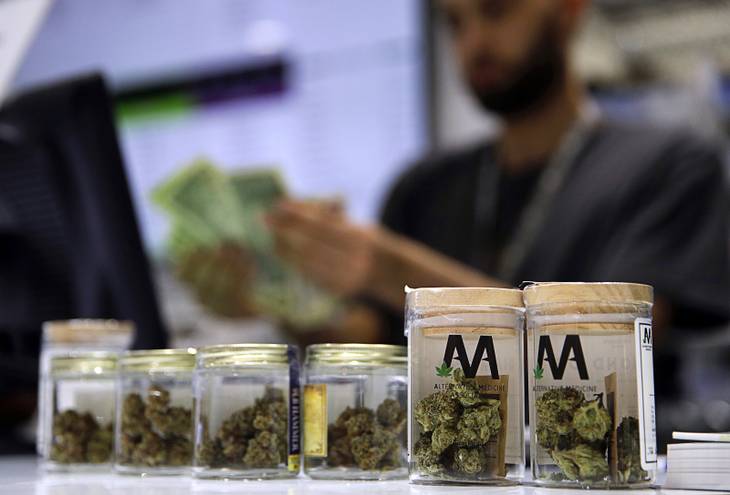Some of the companies awarded Nevada retail marijuana licenses in 2018 could have their licenses frozen under a ruling issued Friday by a Clark County judge.
District Judge Elizabeth Gonzalez’s injunction stops the state from performing a final inspection for any licensees who did not provide the “identification of each prospective owner, officer and board member” as required by language included in a 2016 voter-approved referendum allowing the sale and use of recreational marijuana in the state.
In her ruling, Gonzalez wrote that the Nevada Department of Taxation acted outside of the law when it decided to perform background checks only on partners with an ownership stake greater than 5% on some license applications involving groups of owners.
Four applicants approved for licenses — Helping Hands Wellness Center, Lone Mountain Partners, Nevada Organic Remedies and Greenmart of Nevada — may have not completed background checks required by the original ballot question legalizing recreational marijuana.
Jared Khan, the lawyer representing Helping Hands Wellness Center, said the company was not concerned going forward, as the issue seemed to be a mix-up in regard to who is technically an officer of the company.
He noted that some companies on the plaintiffs’ side of the lawsuit may have problems under the injunction.
“I think the publicly traded companies will have a concern,” he said.
The state issued 61 of the coveted licenses in December out of 462 applicants. The losing bidders sued for an injunction, saying the Department of Taxation’s process in scoring applicants showed favoritism and included many mistakes.
All sides expect the ruling will be appealed to the state Supreme Court, with millions of dollars of sales, taxes and profits at stake in a booming retail pot market.
Gonzalez’s decision came after she heard 18 days of evidence and testimony over several weeks.
Gonzalez wrote that all parties in the lawsuit agreed that language of an original initiative — in this case, 2016’s Ballot Question 2 — would supersede any regulation in conflict.
The ballot question mandated the state “conduct a background check of each prospective owner, officer and board member of a marijuana establishment license applicant.”
After the passage of the ballot question, then-Gov. Brian Sandoval established a task force to determine how to best bring about marijuana legalization. The court found that some of the panel’s recommendations were in conflict with the ballot question, including the decision to make background checks required for only some owners.
Steve Shevorski, the head of complex litigation with the state attorney general’s office, did not immediately return a request for comment.
Attorney Dennis Prince, who represents Essence and Thrive, two licensees not affected by the injunction, said the decision was a good one for his clients.
“What (the decision) enables — in short — it allows all the successful applicants that identified all owners, officers and board members to go forward with their plans and open their doors pending a trial on the merits,” he said.
A trial on the merits, in which a final decision is made, is generally not likely to be much different than the injunction proceedings, he said, adding that he wouldn’t expect substantially new information to be presented at trial going forward.
The injunction hearing, he said, “is effectively a trial.”
The ruling bars the state from giving its final inspection to those who fall under the injunction. The affected businesses can receive zoning permits and begin building their stores, but the state is not allowed to give the final go-ahead to those who didn’t comply with the original language in the statute, as long as the injunction stands.
“Everyone who did comply with that, they can go forward,” Prince said.
The next court hearing before Gonzalez is scheduled for 9 a.m. Aug. 29 to discuss whether to increase the $400,000 security bond, a type of bond put up by plaintiffs to ensure defendants do not suffer if it is decided they were wrongly enjoined.
